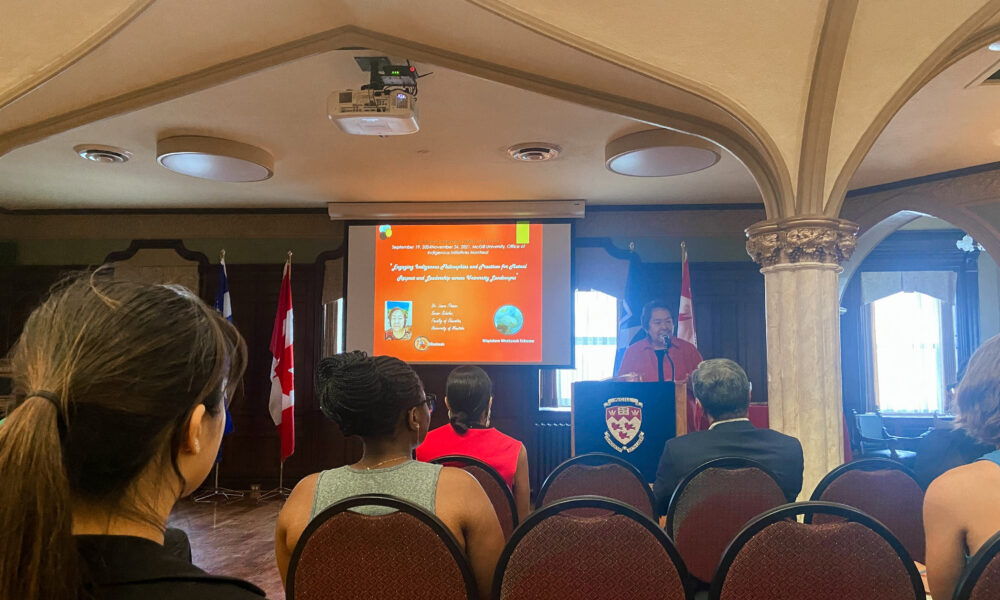McGill’s Office of Indigenous Initiatives (OII) commenced its 13th annual Indigenous Awareness Weeks with an opening talk given by Laara Fitznor, formerly with the University of Manitoba, on Sept. 19. The event, held in the Faculty Club, was titled “Engaging Indigenous Philosophies and Practices for Mutual Respect and Leadership across University Landscapes.”
To open the event, the emcee of the evening, Faculty of Education assistant professor Geraldine King, introduced Faithkeeper Otsi’tsaken:ra (Charlie) Patton to the podium. Otsi’tsaken:ra provide the Ohen:ton Karihwatehkwen or the “words that come before all things,” first in Kanien’kéha followed by a version in English. He recognized and offered gratitude to the trees, sky, water, and other elements of the natural world. He also spoke to the diversity of Indigenous cultures across Canada.
“Amongst our nations we all have different ways that we understood [the creation of the earth] in the languages, in the way we sing, in the way we drum, the way we dance. It’s all about giving thanks for what the Creation has given us,” Otsi’tsaken:ra said.
King then invited McGill President and Vice-Chancellor Deep Saini and Provost and Executive Vice-President (Academic) Christopher Manfredi to share words of welcome.
“[Indigenous Awareness Weeks] has helped foster an environment in which McGill’s Indigenous community members are represented, recognized and celebrated,” Saini said. “We are a proudly diverse university of which our First Nations, Métis, and Inuit community members are an integral part. We have so much to learn from one another and events such as this—which allow us to exchange openly and respectfully on important issues—deeply enrich and strengthen our community.”
The theme of this year’s Indigenous Awareness Weeks is recognizing trailblazers. Fitznor, the keynote speaker of the evening, was a professor at the University of Manitoba and the University of Toronto before her retirement in 2019. Fitznor is a member of the Nisichawaysihk Cree Nation in Northern Manitoba. She spoke about her family history and how it has shaped her understanding of how Indigenous knowledge can be included in academic contexts.
“Family ties [and] reminders of cultural and land responsibilities [are] a backdrop for understanding education,” Fitznor said.
She shared stories about microaggressions that she faced in the workplace and urged allies to show up for their Indigenous co-workers in a tangible way.
“Don’t just say ‘I support you,’” Fitznor said. “Get involved, but don’t lead the way [….] Stand behind us. Work with us, but never ahead of us.”
She also encouraged the roughly 30 attendees to take the lessons they learned from the talk into their daily lives outside of the two weeks dedicated to Indigenous awareness at McGill.
“I think it’s amazing that we have that focus […] of gathering minds and hearts for different activities that can be shared with people,” Fitznor said. “Everyone that’s in this room, your work is to take that forward to the other folks around you, whether it’s with your family or friends, your coursework, and your research, and your community work [….] What [will] you do with what you learn?”
To close out the event, King invited professor Robert Spade from the Schulich School of Music to perform an Anishinaabe honour song. He introduced the song by saying that it recognizes the gift of life.
“Your life is precious. You are pure, however you are today. You have achieved it already. You have it. We are not deficient, and today is not an accident. You belong. You belong here,” Spade told the crowd.
The Indigenous Awareness Weeks will continue until Oct. 2 with talks on Inuit education, Mohawk governance, and Ojibwe Anishinaabe art among others. On Sept. 30, the Faculty of Education will hold its sixth annual Skátne Entewathahíta – We Will Walk Together event for the National Day for Truth and Reconciliation.








